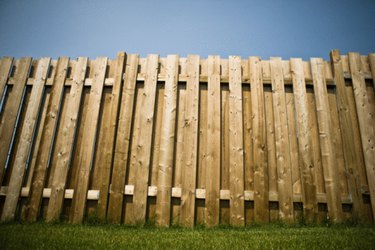A redwood or cedar deck or floor can be one of the most attractive finishes in a home, adding a unique warmth to any living space. To keep your redwood or cedar surface looking its best, periodic maintenance of the wood and finish is required to remove or prevent damage by weathering, sunlight, rust, water stains or mold contamination. An effective method of combating these threats is an occasional treatment with oxalic acid, a bleach that can restore and renew the natural beauty of the wood.

Video of the Day
Things You'll Need
Breathing Masks
Tack Cloth (Optional)
Rubber Gloves
Sandpaper (Optional)
Oxalic Acid (Powdered Or Crystalized)
Sprayer Nozzle (Optional)
2 Plastic Buckets
Safety Glasses
Powdered Borax Or Ammonia
Paintbrush Or Large Sponge
Mixing Sticks
Garden Hose
Step 1
Prepare the wood surface where the stains or blemishes are being bleached. If your deck or floor has been sealed with varnish, sand off the finish by rubbing sandpaper in the direction of the wood grain. Wipe away dust from the wood surface, using tack cloths.
Video of the Day
Step 2
Mix oxalic acid and hot water in a plastic bucket, following the manufacturer's labeled mixing instructions. The common ratio is 2 cups of oxalic acid per gallon of water. Wear rubber gloves and safety glasses during the mixing procedure, taking care not to splash the liquid on your skin or clothing.
Step 3
Apply a liberal amount of the oxalic acid solution to the wood, using the paintbrush or large sponge. If you use a paintbrush, don't dip any metal into the corrosive acid mixture. Spread the mixture over the surface and allow it to sit for five to 10 minutes. If the mixture soaks into the wood, apply more to keep the surface as moist as possible. The bleaching effect will begin almost immediately and can be monitored to attain the desired wood tone.
Step 4
Rinse the wood with clean water. For an exterior redwood or cedar deck, use the garden hose and sprayer nozzle for rinsing, but take care not to splash the rinsed acid onto the home's exterior siding, metal door thresholds or metal patio door frames.
Step 5
Mix a neutralizing solution of ammonia and warm water, or Borax and warm water, in a plastic bucket and thoroughly rinse the wood surface. Follow the manufacturer's label for mixing. The common neutralizing ratio for ammonia is 1 part water to 1 part ammonia. For Borax the ratio is typically 3 tbsp. of borax to each quart of water. Rinse the wood surface with the neutralizing solution and allow to dry thoroughly. The neutralizing solution stops the bleaching action of the oxalic acid.
Step 6
Rinse the deck or floor area once more with clean water and allow the redwood or cedar to dry thoroughly before use or refinishing.
Tip
Read all of the manufacturer’s directions and warning before beginning this procedure. Applying a small amount of the oxalic acid mixture to a scrap piece of wood will give you a sample of how the solution will react with the wood and the performance of the product during use.
For concentrated stains such a rust or black rings from metal furniture legs, mix a paste of 1 part warm water and 3 parts oxalic acid powder or crystals. Apply the paste directly to the stain until the wood surface is bleached to the desired tone.
Warning
Oxalic acid is a highly toxic and corrosive substance. Extreme care should be taken in handling it, both in its raw and mixed states. In addition, gases emitted from it during use can cause health problems, so it should be mixed and applied in a well-ventilated area. A container of clean rinse water should be kept available during use in case you need to flush your skin or eyes or wash away any spilled solution.